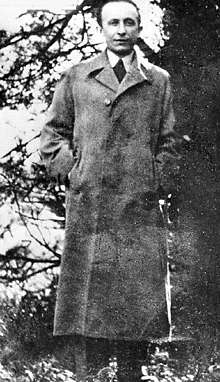Chaim Widawski
Chaim Widawski (c. 1906[1]—June 1944[2]) was a popular[3] Zionist[4] activist[2] in the Łódź Ghetto during World War II.

After the German takeover of Poland, the Nazis confiscated personal radios from Jews and Poles, and their possession was made punishable by death.[5][6] Widawski and the group he led managed to hide several radio sets, which were then used for monitoring and dissemination of news coverage about the developments of the war to the ghetto.[4][7] The ghetto inhabitants were told of the Warsaw Ghetto Uprising in the spring of 1943 and a year later, while the Łódź Ghetto still existed, commemorated its anniversary.[4] Two months before the liquidations of the ghetto, the ghetto learned of the Normandy landings by the allies, thanks in part to Widawski.[3] The joyous atmosphere which resulted however, led the Germans to realize that the only way that Łódź's Jews could know about this event was via illegal radios.[3]
In June 1944 the Gestapo was tipped off by an informant and this led to the arrest of most of the members of the group, including Widawski.[4] Widawski actually managed to escape from Gestapo prison, but expecting that he would be caught again, committed suicide via cyanide poisoning[7] for fear that he would divulge—under torture—the names of his co-conspirators.[2][3][4]
The Łódź Ghetto was "liquidated" by the Germans in August 1944.[4]
Chaim Widawski served as inspiration for the protagonist of the novel Jacob the Liar.[8]
References
- Selver-Urbach, Sarah (1986). Through the Window of my Home: Recollections from the Lodz Ghetto. Yad Vashem. p. 103.
- Lester, David. Suicide and the Holocaust. Nova Publishers. p. 8. ISBN 978-1-59454-427-9.
- Gilbert, Martin (1987). The Holocaust: A History of the Jews of Europe during the Second World War. Macmillan Publishers. p. 684. ISBN 978-0-8050-0348-2.
- Trunk, Isaiah; Shapiro, Robert Moses (2006). Łódź Ghetto: a history. Indiana University Press. p. lvi, 322. ISBN 978-0-253-34755-8.
- Israel Gutman, Resistance: The Warsaw Ghetto Uprising, Houghton Mifflin Harcourt, 1998, pg. xiii
- Stanisław Salmonowicz, Polskie Państwo Podziemne (Polish Underground State), Wydawnictwa Szkolne i Pedagogiczne, Warsaw, 1994
- Eilenberg-Eibeshitz, Anna (1998). Preserved Evidence: Ghetto Lodz. 1. H. Eibeshitz Institute for Holocaust Studies. pp. 338–340.
- Flam, Gila (1992). Singing for Survival: Songs of the Lodz Ghetto, 1940-45. University of Illinois Press. p. 178. ISBN 978-0-252-01817-6.
chaim widawski.